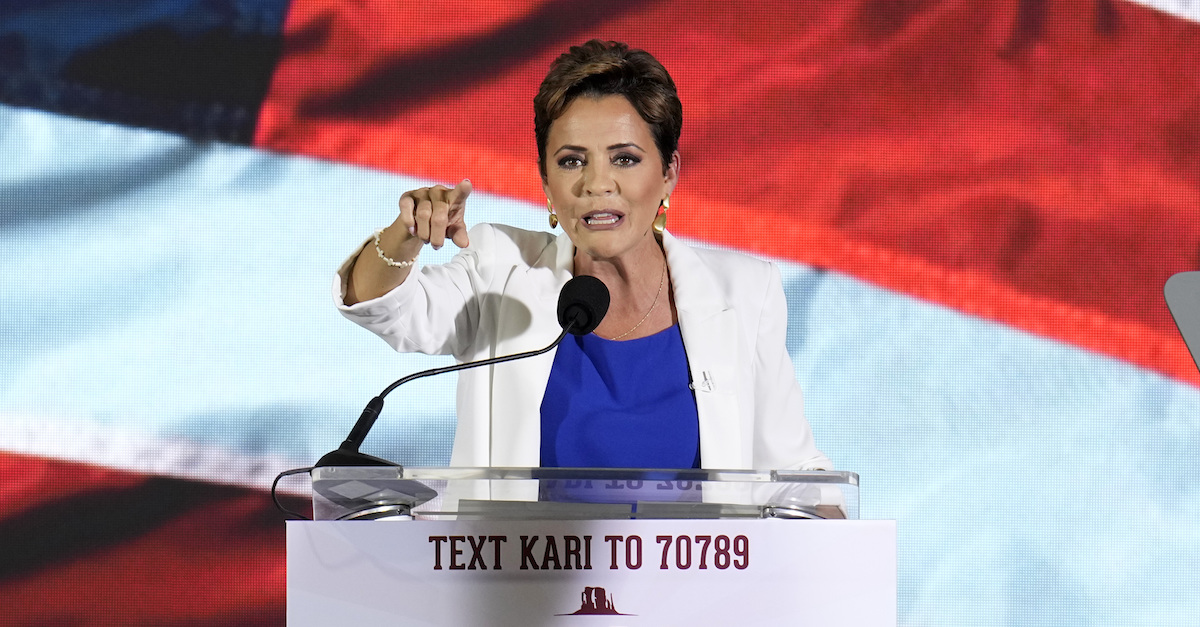
Republican candidate Kari Lake announces her plans to run for the Arizona U.S. Senate seat during a rally, Oct. 10, 2023, in Scottsdale, Ariz. (AP Photo/Ross D. Franklin)
Arizona Republican Senate candidate Kari Lake has asked the U.S. Supreme Court to revive a lawsuit that aims to eliminate the use of electronic voting machines in the United States.
The lawsuit, originally filed when Lake was a candidate for governor of Arizona, was dismissed in August 2022. The district court judge overseeing the matter later sanctioned the plaintiffs for making “false, misleading, and unsupported factual assertions” in their filings. The Ninth Circuit Court of Appeals affirmed the dismissal in October 2023.
The appeal to the nine justices begins with a paean to fears that computerized voting might run roughshod over democracy.
“Public distrust in elections is at an all-time high and growing,” the petition for writ of certiorari reads. “Although electronic voting machines were meant to remedy snafus like the 2000 Florida recount, the flaws that petitioners unearthed in electronic voting machines make hanging chads — the very problem the machines were meant to solve — seem like a blessing. At least there, humans could see and touch ballots and punch cards. By turning elections over to black boxes running software outside the public domain, we surrendered the ability to meaningfully verify the election process.”
The original lawsuit was dismissed when U.S. District Judge John J. Tuchi found Lake and Mark Finchem lacked standing to sue because their claims were “too speculative to establish an injury in fact.”
Casting their lot into the legal Lazarus pit of the nation’s high court, Lake and Finchem say new evidence — not originally known to the plaintiffs — has been revealed “regarding the safeguards allegedly followed to ensure the accuracy of the vote.”
“Maricopa County flagrantly violated state law for electronic voting systems — including using altered software not certified for use in Arizona — and actively misrepresented and concealed those violations,” the petition reads. “Perhaps worse — although potentially unknown to Maricopa — the Dominion Voting Systems, Inc., systems used in Maricopa and almost thirty states have a built-in security breach enabling malicious actors to take control of elections, likely without detection.”
Attorney Lawrence Joseph says the state previously made “false representations” to have the original lawsuit tossed.
“In place of the Arizona-certified election software that Maricopa claimed to use, Maricopa’s election software has been surreptitiously altered with respect to components controlling how ballots are read and tabulated,” the petition reads. “The election results put through this uncertified software are unreliable. Contrary to Maricopa’s representations to the district court, the election software Maricopa used in the 2020 election is not approved.”
The petition argues that the new evidence offers a more direct nexus to the claimed legal harms made by the plaintiffs.
“When petitioners filed this action, there was ‘little question’ of causation or redressability because respondents directly injured petitioners, and a court could have stopped those injuries with injunctive relief,” the petition argues. “The only question about causation and redressability now is whether petitioners’ injuries have now become impossible to redress. Even after elections have been held, however, their injuries would remain partially redressable by an injunction for future elections.”
Lake’s petition singles out one well-known voting machine company as particularly prone to having their systems abused and frames their request as something of a ticking electoral time bomb.
“Without resolution, election results in the numerous states with Dominion voting machines — at the very least — cannot be trusted,” the petition reads. “Without this Court’s concerted effort, the technical capacity to thwart the will of the electorate will escape detection and meaningful review due to election litigation’s short timeframes and complex civil litigation’s long duration.”
Have a tip we should know? [email protected]

